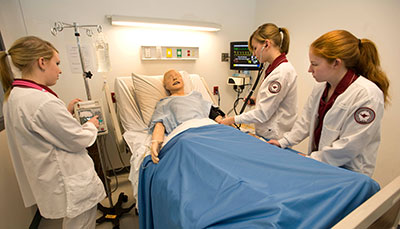The Department of Nursing and Allied Health Professions will host an open house December 9, 2011, from 10:00 a.m. to 3:00 p.m. to showcase its new simulation laboratory in Putt Hall.
The facility is on the first floor of Putt Hall, at Grant and Eleventh streets. The open house is free and open to the community.
This simulation laboratory is specially designed to offer experience and preparation for students interested in working in home health care.
In addition to demonstrations of the equipment in the facility, including high-fidelity manikins that can “talk” to health care professionals, free blood pressure screening is available at a kiosk in the facility during the week from 10:00 a.m. to 5:00 p.m.
The new simulation laboratory also provides hands-on training for students in the use of electronic medical records.
In 2010, the department secured a $299,890 federal grant, authored by Elizabeth Palmer, department chairperson, to create the new simulation laboratory. Palmer is the project director, and Julia Greenawalt, assistant chair, is co-director.
The new simulation laboratory not only has high-fidelity manikins who suffer from a variety of health issues—it also houses the “patients” in a home-like setting.
“Because of a shortage of nurses, there are an increasing number of home health care patients, especially in the rural areas, who are monitored by telehealth systems,” Palmer said. “The simulation equipment will enhance undergraduate nursing education with opportunities to practice nursing care using electronic documentation and telehealth services prior to their on-site experiential work.”
The Putt Hall simulation laboratory manikins are designed with programs to mimic a rural patient with a common chronic illness, such as chronic obstructive pulmonary disease, hypertension, or obesity, the most prevalent health concerns of rural residents in the United States.
“The new simulated laboratory will advantage IUP students because a telehealth nurse must not only receive data from patients, but learn how to work with patients in the home,” Palmer said.

The department introduced its first simulation laboratory in 2007. This lab, in Johnson Hall, was renovated and expanded in 2009 and now includes nine adult manikins, two adolescent manikins, a pediatric (baby) manikin, and other training equipment. The simulation lab has two “hospital” rooms with control-observation areas, with the capability to broadcast to nearby classrooms.
All the manikins not only present with symptoms from a variety of illnesses, but they can talk, allowing the caregiver to know how they are feeling. The high fidelity manikins also change temperature, their pupils constrict, they have seizures, and they expel liquids in all the ways humans do, including sweating and crying.
“Students learn how to care for their patients through our simulation laboratories, and we can recreate the entire hospital experience.
Students portray the doctor, the obnoxious or anxious family member, and other hospital staff in order for our nursing students to understand what they will be facing as nurses.”
In addition to the students taking care of the patients, the students watching from the observation room share in the learning experience.
Knowledge is also shared during the debrief, with students and the instructor offering comments, criticisms, and praise for the way the case was handled.
If a student has difficulty with a particular procedure, he or she can come back for a do-over with the manikin to become proficient. This “zero-fault environment” is unique to simulation and fosters deeper learning, according to the faculty.
“This is a student-centered environment where learning is at the fingertips of the student-caregiver,” Greenawalt said.
Every junior or senior Nursing major must have at least two or three practice sessions in the simulation laboratory with the high-fidelity manikins. Sophomore nursing majors are initiated with the medium-fidelity manikins. Role development is enhanced as they gain more experience.
“By their senior year, our Nursing students have become very skilled with hands-on care,” Palmer said.
Palmer and team are working with a home health agency to get “scrubbed” electronic medical records, which don't have names or identifications, so that students can gain experience from real patient data.
“We have been very, very fortunate to have successfully secured this grant for our home health care simulation laboratory and electronic medical records training equipment,” she said. “Private funds are crucial to our ability to continue to offer cutting-edge training opportunities for our students.”